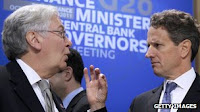Brings money, acclaim and attention
To the local milieu,
Including a few
That the chamber of commerce won't mention.
The GOP's next convocation
In Tampa should bring stimulation
To the owners of clubs
Whose customers love
The artistry of denudation.
Though club owners rather not choose
Which party should win or should lose,
According to strippers
The more lib'ral tippers
Are those of conservative views.
In a revealing look at the economic impact of the upcoming Republican national convention, the New York Times lifts the veil on the notorious Tampa strip club industry. When the nation's GOP delegates descend on the city, club owners expect that their employees will be sitting in the lap of luxury, and with good reason: evidence from the 2008 convention cities suggests that, while the average Democrat spends $50 in a "gentleman's club," the average Republican drops $150 (much of it in singles). On a serious note, dancers assert the need for additional stimulus as, in this economy, it's not easy to grind out a living.






